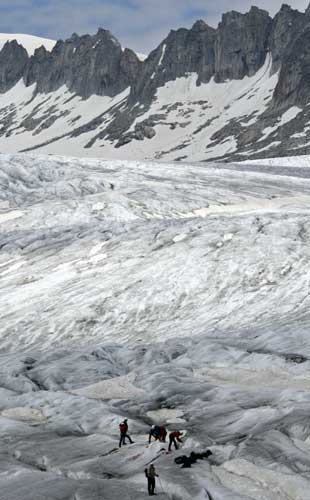How catching cold mountain air could save Europe's glaciers

A German geography professor has developed a controversial system of mountain "wind-catching" screens which he claims could slow or even halt the dramatic rate at which Europe's glaciers are melting.
Glaciers across the globe are shrinking fast as a consequence of global warming. In Europe alone, some researchers have predicted that all its glaciers will have vanished by 2100.
However, Professor Hans-Joachim Fuchs from Germany's Mainz University claims to have found at least a partial answer to the problem. His technique involves capturing the power of cold mountain – so-called kabatic – air streams with wind-catching screens installed on melting glaciers.
The screens are designed to harness the dense kabatic air streams which flow downhill and deflect them directly on to the surface of the glaciers, thereby cooling them enough, it is hoped, to counteract the effects of global warming.
In early August, Professor Fuchs and a team of 27 student researchers from Mainz university travelled to the Rhône glacier in Switzerland. There they installed a 15 metre-long, 10 metre-high wind catching screen at an altitude of 2,280 metres on the glacier in the country's Valais region.
Monitoring has shown that the Rhône glacier is shrinking seven metres a year. However, Professor Fuchs insists that his wind- catcher will help to combat this. "We hope that our installations will bring about a net cooling of the area," he said in a statement. "If the meltdown is not stopped, we hope that it will at least be slowed down," he added.
Glacier experts say that wind-catching screens to stop ice melting are a completely new idea. Until now, the only part answer to the problem has been to cover sections of shrinking glaciers with giant reflective covers that help to cool the ice by deflecting sunlight.
Covers have been used mainly to help preserve Alpine ski slopes. A cover system was set up more than a decade ago at a ski resort on southern Germany's Zugspitze mountain. But it has proved effective only on small areas. It is impractical for entire glaciers, which cover dozens of square miles.
However, not all glacier experts are convinced that his screens will work. The idea has been dismissed outright by Swiss glacier scientists at Zurich's Technical Institute. "If you are trying to cool a glacier, wind screens are a crazy idea," said Martin Funk from the institute. Mr Funk maintains that glacier melt rates are far less influenced by wind temperatures than by the effects of the sun's rays and the atmosphere. "These are the main factors and that is why the covers are so effective," he said. "They reduce melting by about 80 per cent."
However, Mr Funk also agrees that covers are not the answer: "They are just for ski tourists."
Andreas Bauder, another of the Zurich Institute's glacier experts, argued that it would take years to alter measurably the development of a glacier.
Professor Fuchs insists that his project is just a "little test". He added: "We've got lots of sponsors. If all goes well, we shall go ahead with something larger."
Join our commenting forum
Join thought-provoking conversations, follow other Independent readers and see their replies
Comments
Bookmark popover
Removed from bookmarks